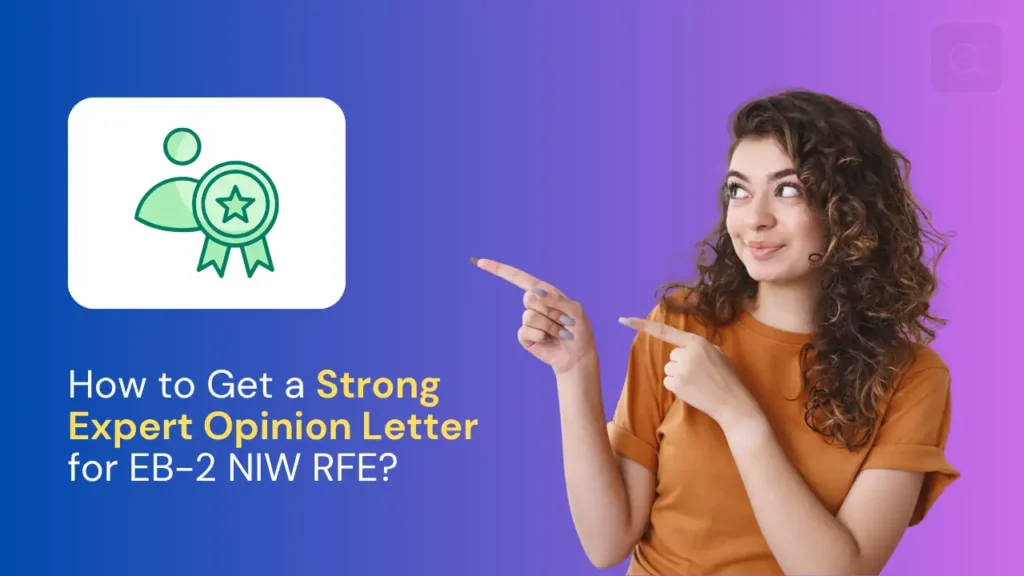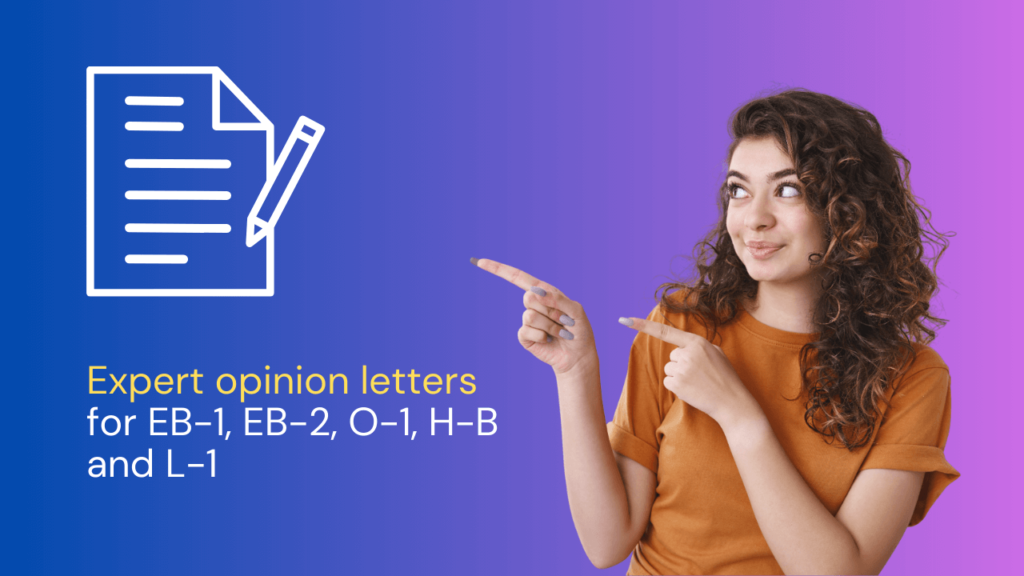Expert Opinion Letter for EB-2 NIW RFE
Receiving an expert opinion letter for your EB2 NIW case can feel overwhelming, especially when you’re faced with a Request for Evidence (RFE). However, you’re not alone — receiving an RFE in an EB-2 National Interest Waiver (NIW) case is more common than you might think.
When USCIS sends you that dreaded RFE, it’s typically triggered by issues like insufficient evidence, inconsistencies in your application, or even changes in USCIS policies. Nevertheless, there’s a powerful tool at your disposal that can significantly strengthen your response: expert opinion letters.
In fact, including 5-7 letters from distinguished independent experts can transform your RFE response from adequate to compelling. These advisory letters serve as crucial third-party validation of your qualifications and contributions, especially since USCIS has updated its guidance on EB-2 NIW petitions.
This guide will walk you through everything you need to know about securing powerful expert letters for EB-2 NIW RFE — from understanding what makes a qualified expert to crafting a persuasive cover letter for RFE response. Let’s dive into how you can turn this challenge into an opportunity to strengthen your case.
Expert Opinion Letters:
What is an expert opinion letter?
An expert opinion letter for EB-2 NIW cases is a formal document written by a recognized authority in your specific field. Primarily, these letters serve as an objective, authoritative evaluation of your qualifications, skills, and professional experience. Unlike personal endorsements, an expert letter provides a detailed analysis that compares your credentials to U.S. immigration standards.
These letters typically include several key components: an introduction explaining the letter’s purpose, the expert’s qualifications, their relationship to you, a comprehensive evaluation of your background, and specific evidence supporting how you meet visa requirements. Additionally, a strong expert opinion letter addresses how your work satisfies the three prongs of the Matter of Dhanasar test with evidence-based assertions rather than vague claims.
Why expert letters matter in EB-2 NIW RFE cases
Expert opinion letters are particularly valuable when responding to an RFE because USCIS adjudicating officers may not be experts in your field. Consequently, these officers rely heavily on objective evidence to make decisions. For EB-2 NIW RFE responses, these letters validate your credentials and provide a credentialed endorsement of your exceptional ability.
Furthermore, a compelling expert letter can significantly influence the success of your EB-2 NIW application by articulating how your work promotes U.S. national interests. This is fundamentally important because it directly addresses a key requirement for the National Interest Waiver. Regarding the recommended quantity, submitting 5-7 letters from distinguished independent experts can substantially strengthen your case.
Difference between expert and recommendation letters
The distinction between expert opinion letters and recommendation letters is crucial for your NIW application. Essentially, expert letters provide independent, objective assessments from authorities who evaluate your qualifications based on evidence, whereas recommendation letters come from people who have worked directly with you.
The structure also differs considerably. An EB2 NIW expert opinion letter analyzes how you meet specific visa criteria through data, citations, and measurable achievements. Conversely, a recommendation letter focuses on personal qualities, work relationships, and firsthand observations of your skills.
USCIS weighs these letters differently in the evaluation process. Letters from your “inner circle” (colleagues, supervisors) offer valuable insights but receive less attention due to potential bias. Meanwhile, expert opinion letters from respected independent professionals (your “outer circle”) carry more weight in decision-making. This explains why independent expert validation is often more persuasive for your RFE response.
AAE Evaluations — Your Consultant for Expert Opinion Letters
When seeking professional assistance with your EB-2 NIW RFE response, AAE Evaluations stands out as a specialized consultant for crafting compelling expert opinion letters. Unlike general immigration services, AAE Evaluations focuses specifically on creating documentation that addresses the complex requirements of EB-2 NIW petitions.
As a trusted credential evaluation company, AAE Evaluations provides comprehensive services that strengthen your NIW application through carefully constructed expert letters. Their team understands how to effectively highlight the substantial merit and national importance of your work—critical elements for petition approval.
What truly distinguishes AAE Evaluations is their methodical approach to developing powerful expert opinion letters. Their process involves several key steps:
- Expert selection based on your specific field of expertise
- Thorough analysis of your credentials and achievements
- Careful assessment of how your work satisfies the Dhanasar criteria
- Custom letter drafting that directly addresses USCIS requirements
- Integration of objective evidence to strengthen your case
Importantly, AAE Evaluations ensures your expert letters don’t rely on generic praise. Instead, they incorporate independently verifiable analytics, statistics, factual data, and quantitative information that transform subjective assessments into objective evaluations. This approach is particularly effective since USCIS officers generally scrutinize letters from undistinguished sources more rigorously than those from recognized authorities.
Beyond crafting compelling content, AAE Evaluations offers practical advantages that simplify your RFE response process. They maintain partnerships with qualified experts across numerous fields and provide flexible timing options to accommodate your immigration deadlines. Moreover, their pricing structure remains transparent with no hidden costs or surprise charges.
While responding to an RFE can feel overwhelming, professional assistance often makes a substantial difference. AAE Evaluations specializes in creating expert opinion letters that specifically address the three prongs of Matter of Dhanasar: demonstrating substantial merit and national importance, proving you’re well-positioned to advance your endeavor, and showing why waiving the job offer requirement benefits the United States.
For your EB-2 NIW RFE response, having 5-7 letters from distinguished independent experts can transform your application from merely adequate to genuinely compelling. With AAE Evaluations’ expertise, you’ll receive documentation that places your achievements in proper context within your field, thereby maximizing your chances of approval.
How Expert Letters Support the Dhanasar Criteria
Expert opinion letters serve as critical supporting evidence for each criterion of the Matter of Dhanasar framework—the cornerstone of EB-2 NIW petition evaluation. According to USCIS guidelines, these letters must substantiate your qualifications across all three prongs with concrete evidence rather than vague praise.
Substantial merit and national importance
For the first prong, strong expert letters must clearly articulate how your work addresses meaningful problems within your field. Effective letters explain your endeavor’s significance beyond your employer to demonstrate broader implications nationally or globally.
Distinguished experts should explain:
- How your work aligns with U.S. government initiatives
- The potential impact on economic development, public health, or technological advancement
- Ways your research or expertise addresses publicly recognized challenges
Naturally, these assertions must be backed by objective evidence—independently verifiable analytics, statistics, and factual data rather than mere opinions. Strong comparative descriptions establish that your contributions substantially exceed those of your peers in the field.
Well-positioned to advance the endeavor
Under the second prong, expert opinion letters must substantiate your ability to execute your proposed work successfully. Firstly, they should highlight your education, skills, knowledge, and record of success in related efforts.
Qualified experts should analyze:
- Your specific achievements that demonstrate expertise
- Your progressive record of accomplishment in your field
- Evidence of recognition through citations, presentations, or awards
Accordingly, experts must go beyond simply listing credentials—they must substantiate how these qualifications position you to make meaningful contributions. This “ready, willing, and able” argument proves you not only possess the knowledge but also have feasible plans to implement it.
Why waiving the job offer benefits the U.S.
For the third prong, expert letters must present a compelling case that bypassing labor certification serves American interests. Hence, experts should explain why your specialized expertise makes traditional employment sponsorship impractical or insufficient.
Authoritative letters should establish:
- How your work creates jobs or stimulates innovation
- Why your endeavor requires flexibility not compatible with standard employment
- The potential urgent or time-sensitive nature of your work
Although these letters don’t replace other evidence, they provide crucial context that helps USCIS officers understand the national importance of your contributions. For maximum effectiveness, submit 5-7 letters from distinguished independent experts who can objectively validate your exceptional qualifications.
Choosing the Right Experts for Your Letter
Selecting the appropriate experts to write support letters is a decisive factor in strengthening your EB-2 NIW RFE response. The right endorsement can make your petition substantially more compelling to USCIS officers.
Who qualifies as a credible expert?
Credible experts for your expert opinion letter typically fall into several categories. Primarily, they should be recognized authorities in your field with established credentials. These may include:
- Distinguished university professors or faculty members
- Government officials or agency representatives
- Leaders in globally recognized industry organizations
- Independent industry professionals with relevant expertise
Above all, credible experts must demonstrate their qualifications to evaluate your work through their own accomplishments, position, and familiarity with standards in your field. Their credibility directly influences how USCIS weighs their assessment of your petition.
Inner circle vs. outer circle experts
The distinction between “inner circle” and “outer circle” experts is crucial for your EB2 NIW application:
Inner circle experts are those who have directly worked with you as colleagues, supervisors, or collaborators. They possess firsthand knowledge of your accomplishments and abilities. Despite providing detailed insights, USCIS often considers these letters potentially biased.
Outer circle experts, on the contrary, include independent authorities who know your work through publications, presentations, or reputation but have no personal or professional connection to you. Their opinions carry substantially more weight with immigration officers.
For optimal results, aim for this mix in your RFE response:
- Independent experts: 3-4 letters (60-70% of total)
- Affiliated recommenders: 1-3 letters (30-40% of total)
How to approach and brief your experts
Initially, have a detailed discussion about your case before approaching potential experts. Subsequently, prepare a comprehensive briefing package containing your credentials, achievements, and relevant documentation.
For outer circle experts unfamiliar with you personally, provide favorable manuscripts from peer review processes as alternatives. These represent unbiased, anonymous evaluations of your work.
Throughout this process, be mindful that USCIS verifies authorship authenticity by checking for inconsistent phrasing or suspiciously similar content across multiple letters. Certainly, when letters appear template-based rather than individually crafted, officers may dismiss all of them as not credible.
As a result, ensure each expert letter for EB-2 NIW RFE is uniquely written and specifically addresses how you meet the Dhanasar criteria with concrete evidence rather than generic praise.
Writing and Structuring a Strong Expert Letter
Crafting a compelling expert opinion letter for your EB-2 NIW RFE requires strategic planning and meticulous attention to detail. The letter’s effectiveness ultimately depends on its structure, content, and presentation.
What to include in the letter
A powerful expert opinion letter should contain several key elements:
- Introduction stating the letter’s purpose and scope
- Expert’s qualifications and credentials relevant to your field
- Nature of the expert’s association with you (if any)
- Objective evidence validating the expert’s authority to evaluate your endeavor
- Detailed analysis of how you meet the Dhanasar criteria
- Expert’s professional resume or CV as attachment
Primarily, your letter must include objective evidence addressing all three prongs of Matter of Dhanasar, not just general endorsements of your abilities.
Using data and evidence to support claims
The strength of an expert letter lies in its evidential foundation. Credible letters incorporate independently verifiable analytics, statistics, factual data, references, citations, and both quantitative and qualitative information.
Obviously, experts may base opinions on hearsay evidence without personal knowledge of all facts, as recognized in legal precedents. Nevertheless, these assertions must still connect to concrete evidence rather than mere speculation.
Avoiding vague or generic language
Steer clear of imprecise terminology throughout your EB2 NIW letter. Exclusively use specific values—exact percentages, measurements, and statistics—instead of vague terms like “a lot,” “most,” or “some”.
Similarly, eliminate subjective descriptors such as “beautiful,” “wonderful,” or “perfect”. These words undermine credibility and diminish persuasiveness. Simultaneously, avoid phrases that suggest absolute certainty like “obviously,” “clearly,” or “undoubtedly”.
Formatting and tone tips
The format and tone of your expert opinion letter significantly impact its effectiveness. Maintain a formal, professional tone throughout the document. Begin with appropriate salutations and use professional letterhead.
Afterward, ensure the letter flows logically from introduction through evidence presentation to conclusion. Paragraphs should be concise and digestible, with proper transitions between sections. For maximum impact, experts should speak with authority but avoid overreaching into legal interpretations.
Ultimately, a well-structured expert letter supporting your EB-2 NIW RFE response transforms abstract qualifications into concrete evidence that USCIS officers can easily evaluate.
Using Expert Letters Effectively in Your RFE Response
A strategic approach for incorporating expert opinion letters in your EB2 NIW RFE makes all the difference between success and denial. Notably, these letters aren’t just attachments—they’re powerful evidence requiring careful integration into your response.
Aligning letters with USCIS concerns
The foundation of an effective RFE response begins with thoroughly analyzing the actual RFE document. Your expert letters must directly address specific concerns raised by USCIS. Consider using the exact wording from the RFE in your letters to demonstrate you’re addressing each issue point-by-point. For instance, if USCIS questions your specialized knowledge, ensure experts provide detailed proof of your expertise in that particular area.
Organizing your RFE response package
Structure your package logically for busy USCIS officers. Include:
- A comprehensive cover letter
- Original RFE notice
- Expert opinion letters targeting specific concerns
- Supporting evidence referenced in the letters
- Table of contents for substantial documentation
Properly labeled sections with tabs make navigation easier for reviewing officers.
Cover letter for RFE response
Your cover letter serves as a roadmap for the entire response. It should outline:
- Your understanding of why you received the RFE
- Documents you’re submitting
- How these materials address each concern
- Explanation for any unavailable documents
- Alternative evidence provided if necessary
How many expert letters to include
Most experts recommend submitting 5-7 letters from distinguished independent authorities. Remember that quality trumps quantity—a few strong, detailed letters outweigh numerous vague ones. Balance your submissions between “inner circle” colleagues and “outer circle” independent experts for maximum credibility.
Conclusion
Responding effectively to an EB-2 NIW RFE requires strategic planning and compelling evidence. Expert opinion letters stand out as powerful tools that can transform your case from adequate to exceptional. Therefore, understanding how to secure strong expert letters becomes crucial for your immigration journey.
Credible experts who validate your achievements provide objective third-party assessment that USCIS officers find particularly convincing. Although receiving an RFE might feel discouraging, this opportunity allows you to strengthen your case with 5-7 carefully crafted letters from distinguished authorities in your field.
Remember, the quality of your expert letters matters more than quantity. Each letter must specifically address the three prongs of Matter of Dhanasar with concrete evidence rather than vague praise. Consequently, your letters should demonstrate substantial merit, prove you’re well-positioned to advance your endeavor, and explain why waiving the job offer requirement benefits the United States.
The distinction between “inner circle” and “outer circle” experts significantly impacts how USCIS evaluates your evidence. Independent experts who know your work through publications or reputation carry more weight than colleagues or supervisors. Thus, aim for a balanced mix with emphasis on outer circle authorities.
Your RFE response package should be organized logically with a comprehensive cover letter that maps out how each piece of evidence addresses specific concerns. Additionally, proper formatting ensures USCIS officers can easily navigate your documentation.
Facing an RFE for your EB-2 NIW petition might seem challenging, but with well-crafted expert opinion letters, you can substantially improve your chances of approval. After all, these letters serve as crucial validation of your qualifications and contributions to American interests. Armed with this knowledge, you can confidently prepare a robust response that showcases your exceptional abilities and the national importance of your work.
FAQs
Q1. What is an expert opinion letter for EB-2 NIW cases?
An expert opinion letter is a formal document written by a recognized authority in your field that provides an objective evaluation of your qualifications, skills, and professional experience. It analyzes how you meet specific visa criteria using data, citations, and measurable achievements.
Q2. How many expert letters should I include in my EB-2 NIW RFE response?
It’s recommended to include 5-7 letters from distinguished independent experts in your EB-2 NIW RFE response. This number provides a strong foundation of support without overwhelming the USCIS officer reviewing your case.
Q3. What’s the difference between inner circle and outer circle experts?
Inner circle experts are those who have directly worked with you, such as colleagues or supervisors. Outer circle experts are independent authorities who know your work through publications or reputation but have no personal connection to you. USCIS generally gives more weight to outer circle expert opinions.
Q4. How should expert opinion letters address the Dhanasar criteria?
Expert letters should address all three prongs of the Dhanasar criteria: demonstrating substantial merit and national importance of your work, proving you’re well-positioned to advance your endeavor, and showing why waiving the job offer requirement benefits the United States. They should use concrete evidence and specific examples to support these points.
Q5. What should I avoid when preparing expert opinion letters?
Avoid using vague or generic language, subjective descriptors, and absolute statements. Don’t rely on template-based letters or include similar phrasing across multiple letters, as this can diminish credibility. Instead, ensure each letter is uniquely written and specifically addresses how you meet the visa criteria with concrete evidence.



